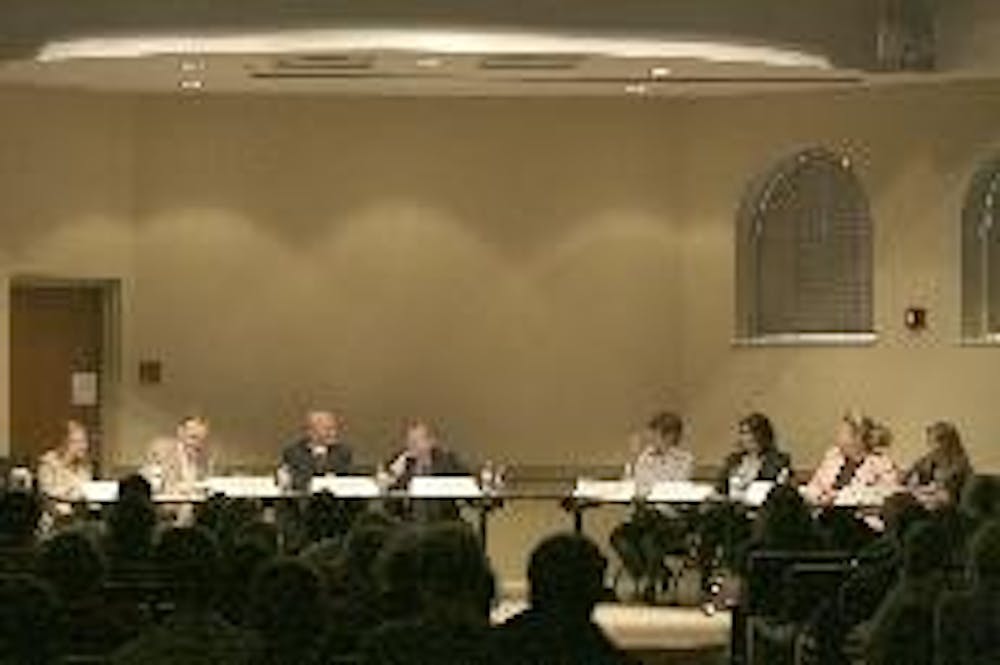
A panel featuring viewpoints from opposing sides of the NCLB debate, met Wednesday night in 322 McGuffey Hall to discuss the validity of the act.
Sporting T-shirts that read, "I am not a number," students represented the No Child Left Behind Reparation (NCLBR) group during a debate Wednesday evening in a packed room of students and faculty members in McGuffey Hall.
The group, which was formed in fall 2006, attempts to create awareness on their desire to amend the No Child Left Behind Act. This particular debate featured a dialogue about the NCLB Act and its upcoming reauthorization.
"We are hosting this debate in order to inform the student body what No Child Left Behind it, and why it is affecting them and our educational system," said Kay Sand, president of NCLBR. "The No Child Left Behind Act is something that is shaping our youth and the youth of the future ... Right now they want to pass standardized testing in college with an assessment on all college levels."
The No Child Left Behind Act is a piece of federal legislation signed into effect by President George W. Bush in January 2002. The nation's public school systems have been affected, because the act holds teachers accountable for student learning by means of standardized testing. Districts that have a majority improvement and pass these tests receive extra funding while districts that are "failing" lose funding.
The debate featured those in favor of the legislation and those opposed, who were asked various questions relating to NCLB. The eight panel members were chosen by NCLBR based on being well-informed individuals with passion relating to bettering the education system.
The affirmative panel shared their views based on knowledge of the act, as well as personal experiences.
"A lot of people associate NCLB with assessment ... the difference is NCLB is an intervention law, a new concept where schools can see if children are failing to achieve ... (and) they are provided considerable help," said Kevin Jones, associate professor in the department of educational psychology.
Affirmative panel member Herbert Dietz, principal and career technical education director for the Hamilton City School District, said the policy makes teachers notice some of the students that may ordinarily slip through the cracks.
"As a principal for many years I could go by and not pay any attention to the sub-groups ... the bottom line is for years the sub groups just fell through the cracks," Dietz said. "They leave high school ... they are not moving forward ... (NCLB) made me look carefully at everybody."
A sub-group refers to students that are not performing up to par academically.
Enjoy what you're reading?
Signup for our newsletter
The opposing panel also used their knowledge and experience to share their opinions.
"The schools that need the money the most are losing it focusing on the test, and not the joy of learning," said Ashley Szofer, Miami senior graduating in May with a bachelor's degree in adolescent language art education.
"It's great in ideals but it has become bureaucratized ... it is hurting the very students it is proposing to help," said Lisa Weems, assistant professor in the department of educational leadership at Miami. "That is because those very students are labeled as deficient ... before they come to the classroom. It further makes school a form of terrorism."
The panel members were not the only people in the room that voiced their opinions on the issue.
"I was taken aback when (Weems) identified the testing process of the NCLB act as a form of terrorism," said sophomore audience member Kelly Love. "I believe individual assessment is necessary to identify specific weaknesses in order to achieve improvement in each an every student, not scrutinize students who test below average."
Said noted that awareness is needed because the NCLB Act is up for reauthorization this year.




